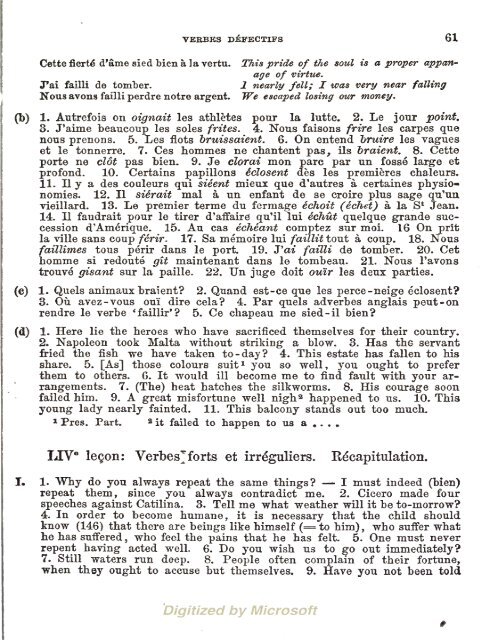comparative french-english studies, ninth edition - World eBook ...
comparative french-english studies, ninth edition - World eBook ...
comparative french-english studies, ninth edition - World eBook ...
Create successful ePaper yourself
Turn your PDF publications into a flip-book with our unique Google optimized e-Paper software.
(b)<br />
VERBES DEFECTIFS 61<br />
Cettefiert6 d'ame sied bien a la vertu. This pride of the soul is a proper appan-<br />
age of virtue.<br />
JPai failli de tomber. 1 nearly fell; I was very near falling<br />
Nous avons failli perdre notre argent. We escaped losing our money.<br />
1. Autrefois on oignait les athletes pour la lutte. 2. Le jour point.<br />
3. J'aime beaucoup les soles frites. 4. Nous faisons frire les carpes quo<br />
nous prenons. 5. Les flots bruissaient. 6. On entend bruire les vagues<br />
et le tonnerre. 7. Ces hommes ne chantent pas, ils braient. 8. Cette<br />
porte ne clot pas bien. 9. Je clorai mon pare par un fosse large et<br />
profond. 10. Certains papillons eclosent des les premieres chaleurs.<br />
11. II y a des couleurs qui sieent mieux que d'autres a certaines physionomies.<br />
12. II sierait mal a un enfant de se croire plus sage qu'un<br />
vieillard. 13. Le premier terme du fermage echoit (echet) a la S* Jean.<br />
14. II faudrait pour le tirer d'affaire qu'il lui echut quelque grande succession<br />
d'Amerique. 15. Au cas echeant comptez sur moi. 16 On prit<br />
la ville sans coup ferir. 17. Sa memoire lui faillit tout a coup. 18. Nous<br />
faillimes tous perir dans le port. 19. Fai failli de tomber. 20. Get<br />
homme si redoute git maintenant dans le tombeau. 21. Nous 1'avons<br />
trouve gisant sur la paille. 22. Un juge doit ouir les deux parties.<br />
(c) 1. Quels animaux braient? 2. Quand est-ce que les perce-neige eclosent?<br />
3. Ou avez-vous oui dire cela? 4. Par quels adverbes anglais peut-on<br />
rendre le verbe 'faillir'? 5. Ce chapeau me sied-il bien?<br />
(d) 1. Here lie the heroes who have sacrificed themselves for their country.<br />
2. Napoleon took Malta without striking a blow. 3. Has the servant<br />
fried the fish we have taken to-day? 4. This estate has fallen to his<br />
share. 5. [As] those colours suit 1<br />
you so well, you ought to prefer<br />
them to others. 6. It would ill become me to find fault with your arrangements.<br />
7. (The) heat hatches the silkworms. 8. His courage soon<br />
failed him. 9. A great misfortune well 2<br />
nigh happened to us. 10. This<br />
young lady nearly fainted. 11. This balcony stands out too much.<br />
1 Pres. Part. 2 it failed to happen to us a ....<br />
IJV e<br />
legon: Verbes; forts et irrdguliers. Recapitulation.<br />
I. 1. Why do you always repeat the same things? I must indeed (bien)<br />
repeat them, since you always contradict me. 2. Cicero made four<br />
speeches against Catilina. 3. Tell me what weather will it be to-morrow?<br />
4. In order to become humane, it is necessary that the child should<br />
know (146) that there are beings like himself (= to him), who suffer what<br />
he has suffered, who feel the pains that he has felt. 5. One must never<br />
repent having acted well. 6. Do you wish us to go out immediately?<br />
7. Still waters run deep. 8. People often complain of their fortune,<br />
when they ought to accuse but themselves. 9. Have you not been told
















